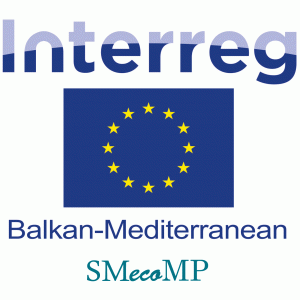A knowledge Alliance in Eco-Innovation Entrepreneurship
to Boost SMEs Competitiveness
The SMecoMP project is an effort to develop a network of parties interested in promoting eco-management and eco-innovation among SMEs in the region. The network’s first effort is to develop training programs to improve the skills of business executives in Eco-Innovation Entrepreneurship and to introduce these skills to students.
Background:
Small and medium-sized enterprises (SMEs) dominate economic activity in all countries of the programme area. Despite their, substantially above EU average, contribution to their economies, SMEs in the programme area face strong challenges, especially in the areas of entrepreneurship and environment, which are exacerbated by the continuing economic crisis. Despite recent efforts to ease the process of starting and closing a company, there are still significant problems in promoting the set up of innovative, growth producing SMEs. Although countries in the area have some of the highest proportions of micro-enterprises in the EU, these are mostly small business focused primarily on producing current family income instead of boosting innovation and generating growth. Furthermore, only a small proportion of SMEs are investing in resource-efficiency measures or produce ‘green’ products/services. There are still vast opportunities, shared by all countries in the area, in both managing environmental resources and natural beauty areas (for example SMEs in alternative and eco-tourism or in green food supply chain) and introducing environmental issues in managing SMEs (energy efficiency, waste reduction, etc). Another common challenge is the brain drain phenomenon, which though could also be viewed as an asset for SMEs since they can capitalize on young people with good education high motivation and excellent talent. The SMecoMP project addresses the above common challenges and exploits the use of common assets, by creating a network of academic institutions and businesses’ umbrella organizations in the programme area that will develop an educational framework to create and support eco-entrepreneurship and the appropriate eco-management tools and skills for businesses’ staff and managers. The project’s approach relies mainly in developing a business-university collaboration across countries in the programme area to promote eco-entrepreneurship, management and innovation. Universities are an integral part of the “skills and innovation supply chain” to business. However, for this supply chain to be of high quality, strong, resilient and close collaboration, partnership and understanding between business and universities is required. These are the foundations upon which the SMecoMP Transnational Network will be developed in order to address the two main common challenges identified above, inadequate entrepreneurship education and environmental and resource management knowledge and skills. Through collaboration the SMecoMP will develop a comprehensive framework of training curricula that include courses, coaching and mentoring tools, seminars, workshops, impromptu think tanks and motivational videos, provided through classroom or electronic environments. Although none of these tools is innovative on its own, the combination of all of them, their tailor-made learning modules on eco-entrepreneurship and management and their focus on SMEs, definitely covers an existing gap in the programme area. SMecoMP will teach, mentor and coach green entrepreneurs that will produce/offer a product, service, or process that benefits the environment. Promoting the participation of the area’s SMEs in the “green economy” and, in the same time, exploring cooperation opportunities, will improve the area’s competitiveness.
The project’s main target groups and their benefits are:
- SMEs will benefit from receiving training for their staff and managers in eco-management practices, from sharing experiences and know-how, improving economic performance and competitiveness
- SMEs’ staff will improve their skills and competences, enhancing their performance at current occupation and also their employment opportunities
- Young entrepreneurs will receive training, coaching and mentoring that will improve their abilities to function effectively as entrepreneurs or in an entrepreneurial capacity, launching their own SMEs and pursue personal ventures and propagate relevant values and knowledge
- Universities will improve their understanding of markets’ needs, improve curricula and enhance cooperation with businesses. Academic and technical staff, through sharing experiences with business, will improve their teaching material and update their research agenda. Students will acquire enhanced skills that will allow them to think creatively, be innovative, develop an awareness of intellectual assets and enhanced capacity to manage and exploit them.
